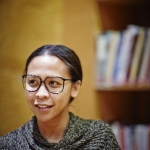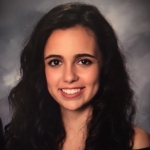emerging leaders network
emerging leaders network
A Rare Species in the Midwest
emerging leaders network
The Rise of the Mid-Career Arts Professional
emerging leaders network
The Cost of Creativity
emerging leaders network
Arts Leadership and the Changing Social Contract
emerging leaders network
Automated Asks and Personalized Packages: Arts Management in 2023
emerging leaders network
With a Little Help from My Friends – A Verbose Thank You to Emerging Arts Leaders
emerging leaders network
Reading between the Lines: Crossing the Generational Barriers of Ethnic and Cultural Audience Development
emerging leaders network
Charting the Future: Why we need new Visionary Ideas, Values, and Models to Propel Communities forward through the Arts
emerging leaders network
Young Artists in Small Towns: Contexts of Creativity
emerging leaders network
Inverting the Pyramid

Gerald Yoshitomi
emerging leaders network
2014 Honoree -
Biography
Chris Appleton, our 2014 American Express Emerging Leader Awardee, is Founder and Executive Director of WonderRoot. Founded in 2004, WonderRoot’s is Atlanta’s leading arts and activism organization. Often celebrated for its championing of both artists and community, WonderRoot supports artists to have professional careers in Atlanta and works to address social justice, environmental justice, health, and youth development issues through the arts.
emerging leaders network
Start a Program
emerging leaders network
Emerging Leaders Award
emerging leaders network
Arts Leadership Classroom

Cristyn Johnson
Spark a Creative Conversation During National Arts & Humanities Month
Posted by Oct 04, 2018

Cristyn Johnson
Happy National Arts and Humanities Month! Each October, millions of people across the country celebrate the transformative power of the arts in their communities. National Arts and Humanities Month is a “coast-to-coast collective recognition of the importance of culture in America,” with the goals of: FOCUSING on the arts at local, state, and national levels; ENCOURAGING individuals and organizations to participate in the arts; ALLOWING governments and businesses to show their support of the arts; and RAISING public awareness about the role the arts and humanities play in our communities and lives. During National Arts and Humanities Month, some truly amazing celebrations of arts and culture take place across the country. One of the big initiatives for the month is Creative Conversations, which gather community leaders to “discuss local arts, culture, and creativity to generate partnerships and increased energy around the grassroots movement to elevate the arts in America.”
Read More
Ms. Kai Monet
The Privilege of Voice
Posted by Sep 14, 2018

Ms. Kai Monet
The MOCA Teen Program, which I co-manage, is an academic yearlong paid internship for 18 students that supports teens on a journey of self-discovery through learning about art, the museum, and the world. In the process of selecting candidates, we look for individual voices that can become part of a diverse and connected community. Students who come from privilege are empowered to have a voice from a young age. Students with fewer resources are not, and face a disadvantage before even applying for the MOCA Teen Program. The unequal empowerment of student voices illuminates a systematic barrier for youth to be prepared and competitive candidates for art and leadership pipeline opportunities. While the MOCA Teen Program aims to empower the voices of our program participants, we may be perpetuating cycles of privilege if our selection process gravitates towards privileged applicants. We must put more resources and thought into equitable recruitment and application processes to creative pathways if we are to overcome this barrier to diversity in our field.
Read More
Citlali Pizarro
From Diversity to Justice: How One Intern’s Experience Informs Efforts to Diversify the Arts Education Leadership Pipeline
Posted by Sep 12, 2018

Citlali Pizarro
Since the age of five, theater has served as my safe place, my platform, my passion, and my megaphone. It empowers me, strengthens me, and mobilizes me in an ethereal and visceral way that nothing else can. And yet, for the first nine years of my theater career, all my directors and theater teachers were white. Even now, years later, the vast majority of the faculty in my college’s theater department are white. This reality is an injustice. And still, my existence is proof that theater, and more broadly, the arts, shape our notions of what is possible for ourselves and the world around us. Art is restorative. Art is transformative. Art is healing. Art is resistance. It is for this reason, among many others, that arts leadership, and especially arts education leadership, must be representative of those who exist at the intersections of marginalized identities.
Read More
Ms. Caryn Cooper
Working Through and Around Challenges of the Pipeline in Arts Education
Posted by Sep 12, 2018

Ms. Caryn Cooper
Working in any field, we want assurance that there is upward mobility in our careers. Once upon a time, that is something that would often happen. One would start in a specific entry-level role and move up the ranks to be a top-level executive. However, today things in the nonprofit sector, and more specifically in arts education, look a little different. This is due in part to several systemic challenges that often limit the opportunities of growth for emerging leaders. Given these challenges, how can an emerging leader in arts education work through and around these systemic barriers?
Read More
Mr. Jeff M. Poulin
Embracing Cyclical Mentorship and Our Commitment to Arts Education
Posted by Sep 10, 2018

Mr. Jeff M. Poulin
Over the past two summers, I have had the unique privilege to work with three incredible mentees through the internship program here at Americans for the Arts. With all three of these individuals, I worked hard to impart much of my knowledge about arts education, the nonprofit arts sector, the inner working of Washington, D.C.’s advocacy infrastructure, and much more. However, it was through these unique relationships that I also learned from them and grew as a person; we were engaging a process of cyclical mentorship. Often, we approach the leadership pipeline in the field as a departing of knowledge from the older generation to the younger. This process, though utilized effectively in the cultural sphere, leaves much to be desired. As we work together in the field, we must be aware of our own advancement in the pipeline and how we are interacting in relation to other operating alongside us.
Read More
Jacqueline Flores
The Power of Representación y Oportunidad
Posted by Sep 10, 2018

Jacqueline Flores
Research shows that people who look and have experiences like mine are less likely to continue higher education. I often find myself to be the only Latina in the room and the only person from an underprivileged background. Aside from seeing this in my own environment, I have seen it in the works being produced on stage around the country. The first time I saw someone that looks like me play a leading role on stage was a couple of months ago, at twenty-two years old. The narrative has to change. I am diligently working towards doing just that, but I am the exception to a very large statistic. I want to make sure that we all start having colleagues of different backgrounds and skin colors. I want us all to read books, see plays, and hear music that is written, performed, and produced by people that look like us. Providing equitable access to a well-rounded education that includes the arts can do these things.
Read More
Jordan Campbell
Fostering Dialogue and Taking Action: Creatively Breaking Down Barriers is an Ensemble Effort
Posted by Sep 10, 2018

Jordan Campbell
In an age of unpaid internships, I have done my fair share of work for the “professional experience” it might bring. (I’ve also been asked to do arts-related events for free or at a very low cost—presumably because I am a young person and might want the “exposure.”) I have experienced some of these systemic barriers on my professional journey. It is my hope that arts education can begin to pull away from that linear mode of thinking and gravitate more toward the concept highlighted in our research—a cyclical leadership—that can foster authentic, diverse, and collaborative work environments. This year, as a candidate for the Arts in Education Ed.M Program at Harvard University, I seek to continue this discussion with my academic cohort of teaching artists, arts managers, curators, and nonprofit leaders. We each have a role to play in breaking down the barriers for emerging leaders.
Read More
Erika Hawthorne
From Shy to Fly—How the Arts Developed My Self Worth
Posted by May 11, 2018

Erika Hawthorne
I first realized I had the power to create change through the arts in a small camp in my hometown, Rockford, IL. I was just a little girl trying to muster up the courage to get on stage and perform when I attended the Rockford Area Arts Council Camp for Young Creatives. Waiting backstage with knots in my stomach, fingernails digging into my fingertips to distract from my nerves, I reassured myself I knew all the moves. “I got this,” I thought to myself, “...but wait! What’s step one again!?” The music starts and my body takes over, making all the right decisions on time. All that was required of me was trusting my capacity to pull it off. It was before I knew what it meant to be a woman of color and the importance of representation in leadership roles, and before I could speak intelligibly about diversity, equity, and inclusion in the arts.
Read More
Jenny M. Chu
A.W.E in Portland: Arts Workers for Equity
Posted by May 10, 2018

Jenny M. Chu
I work in the nonprofit arts sector in Portland, Oregon, which is 76% white despite the growing racial and ethnic diversity in the country. This whiteness was deliberately designed. In the 1800s, exclusionary laws were ratified into the Oregon constitution and the language wasn’t officially removed until 2002. This history is reflected in who lives, works, and plays here, including the demographic makeup of who runs our cultural and artistic institutions. In 2016, a group of us arts administrators came together with the evocative question: “Why are the arts so white?” A truly grassroots operation, Arts Workers for Equity (AWE) is a collective of ten individuals who represent a multitude of intersectional identities. Alone and individually, we had limited power to effect change. But collectively we’ve influenced Portland’s nonprofit arts sector, citywide.
Read More
LaShawnda Crowe Storm
What does it mean to be accountable?
Posted by May 09, 2018

LaShawnda Crowe Storm
Several years ago, as I struggled to further define and understand my own work as an artist, my mentor and friend asked me one simple question “Are you doing healing work or just making art about something?” It took me more than two years to answer that question. Longer still to understand what she meant. Even longer to understand what it truly means to be accountable to myself, the community, those that came before, and those yet to be born. As a community-based artist, organizer, and occasional urban farmer, my creative practice is rooted in exploring and expanding methodologies that utilize art as a vehicle for dialogue, social change, and community healing. For several years, however, what I did not do: interrogate and explore the moral and ethical implications of working in community. Beyond a trendy catch-phrase, what did I mean when I said community healing?
Read More
Josh T. Franco
Questioning the value of change from inside the Archives of American Art
Posted by May 09, 2018

Josh T. Franco
In response to the prompt for this writing: yes, I have been at the forefront of critical changes, and I can identify the factors empowering me to do so. Those changes, centered on an inclusive understanding of what constitutes “American art,” will certainly continue to motivate my work. As I settle into my new role, however, I realize that my power to create change in the arts is rooted in a desire to encourage students and my peers to take a beat, and ask ourselves if and when we are seeking change for change’s sake. Is forward always the best direction? In my hours of conversation and archival dives, it is apparent to me every day that many of today’s issues are not unique.
Read More











 Convene Locally
Convene Locally



